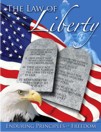
There have been a number of issues in the national spotlight recently that are directly connected to the principle of religious liberty. The controversy surrounding the decision of Judge Roy Moore to defy a federal court order directing the removal of the Ten Commandments Monument from the Alabama state courthouse has captured national attention. The issue of whether or not prayer should be allowed, banned, or mandated in public schools has been debated for years. The campaign to remove God from the pledge of allegiance, our money, and the public arena in general is now being waged in the courts. What does the constitution say about religious liberty and what are the rights that it guarantees to Americans?
The first amendment to the Constitution of the United States of America says, "Congress shall make no law respecting the establishment of a religion, or prohibiting the free exercise thereof, or abridging the freedom of speech, or of the press." With regard to religious freedom the amendment has two protections guarding against two opposing extremes. First it says, "Congress shall make no law respecting the establishment of a religion," so the first protection is against the abuses and inconsistencies of a state or national church. This is often referred to as the Establishment Clause. Second, when it says, "or prohibiting the free exercise thereof," it provides protection against the opposite extreme of having a government which is hostile to religion. This is called the Free Exercise Clause. Any interpretation of this amendment that focuses on one of these clauses while ignoring the other is a violation of the first amendment. Religious freedom should mean that citizens have a guaranteed right to worship, or not, as they please.
What is the result when the government becomes hostile to religion? We have examples from history. The French Revolution comes to mind, where many of the clergy were killed, churches were closed and all things religious were banned. More recently, the nations of communist Russia and China give a good picture of governments hostile to religion. Today, with the controversy surrounding the public display of the Ten Commandments, school prayer, and the desire on the part of radical secularists to remove any mention of God from the public arena, the question should be asked, "Is the government becoming hostile to religion?" When any society turns its back on the moral principles which form the underpinnings of Godís law, it is headed for chaos.
What about a state-established or supported religion? History provides numerous examples of what happens when there is an established state religion. The result has been intolerance of non-state supported religions and the persecution of all who have different beliefs. The crusades, the inquisition, the massacre of the Waldenses and Huguenots, the persecution of Protestants by Mary I of England followed by the persecution of Catholics by her sister Elizabeth when she came to poweróall show the results of the union of church and state. Given political power, Christians in ages past have used the blade, the flames, and many other methods of torture to compel obedience to their version of "Christianity."
Any religion that is following the will of God and is under His blessing and protection will not need to appeal to the state for help in order to prosper and grow. Union of the state with the church leads at best to favoritism and at worst to persecution of dissenters and religious minorities; religious liberty is entirely impossible under such a union. America has already proven by example that church and state prosper far more when they are separate and able to act independently of each other. History teaches that a church or religion which gains the support of the state loses its spirituality and its freedom.
Using force to impose religious laws on society violates the principle of freedom of choice central to Godís government of love. When Jesus was here on this earth, there were plenty of zealous fanatics willing to use force, politics or the sword to change society; Christís method was radical because He preached inner spiritual change, not outward political revolution. Christ said, "My kingdom is not of this world." John 18:36.
A society which loses its morality is a threat to faith and in danger of destroying itself. A society where morality is imposed by a united church state is a threat to religious freedom and the right to worship according to the dictates of conscience. America has done a remarkable job thus far in preserving the balance between "Establishment" and "Free Exercise." The church can do its part to preserve the morals of society by preaching the law, sin, repentance and salvation; by providing true spiritual guidance, and lifting up Christ, the way, the truth and the life.
Do you believe that the condition of declining moral standards in America is apalling, that America needs to take a stand on the Ten Commandments? At the same time do you belive that the law was done away with on the cross? Maybe it is time to look away from the debate as to whether or not the Ten Commandments should be displayed in public places, and to ask ourselves if these laws are written in our own hearts. Maybe we should argue about the law less and keep it more. It will do little good to place the law in every public building in the land if we do not love and cherish it in our hearts.
|
